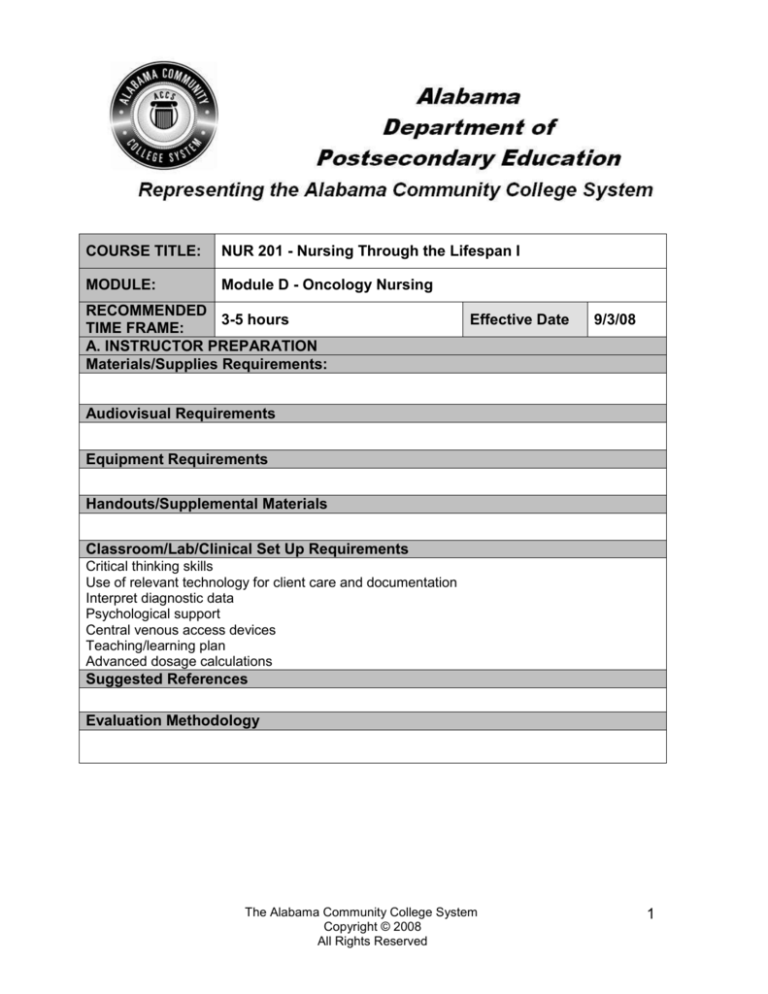
COURSE TITLE:
NUR 201 - Nursing Through the Lifespan I
MODULE:
Module D - Oncology Nursing
RECOMMENDED
3-5 hours
TIME FRAME:
A. INSTRUCTOR PREPARATION
Materials/Supplies Requirements:
Effective Date
9/3/08
Audiovisual Requirements
Equipment Requirements
Handouts/Supplemental Materials
Classroom/Lab/Clinical Set Up Requirements
Critical thinking skills
Use of relevant technology for client care and documentation
Interpret diagnostic data
Psychological support
Central venous access devices
Teaching/learning plan
Advanced dosage calculations
Suggested References
Evaluation Methodology
The Alabama Community College System
Copyright © 2008
All Rights Reserved
1
Nursing Through the Lifespan I
Module D – Oncology Nursing
NUR 201
B. COMPETENCIES AND OBJECTIVES
COMPETENCY
STUDENT PERFORMANCE OBJECTIVES
1.0 Provide nursing care for clients with
1.1 Apply the nursing process for clients with
cancer.
cancer.
Instructor Notes:
C. LEARNING OBJECTIVES
D1.1.1 Define terms associated with treatment of cancer.
D1.1.2 Describe legal and ethical issues related to cancer.
D1.1.3 Describe the pathophysiology associated with cancer.
D1.1.4 Describe the role of the nurse in prevention and detection of cancer.
D1.1.5 Interpret clinical manifestations of cancer.
D1.1.6 Interpret diagnostic tests and staging for cancer.
D1.1.7 Describe oncological agents and treatments for cancer.
D1.1.8 Evaluate nutritional considerations for clients with cancer.
D1.1.9 Identify expected outcomes of treatment modalities.
D1.1.10 Describe psychosocial needs of clients, families, and support systems.
D1.1.11 Use critical thinking to manage nursing care for culturally diverse clients with
cancer.
D1.1.12 Evaluate expected outcomes of nursing care of clients with cancer.
D1.1.13 Identify impacts of cancer on maternal and pediatric clients.
Instructor Notes:
ACCS Copyright © 2008
All Rights Reserved
2
Nursing Through the Lifespan I
Module D – Oncology Nursing
NUR 201
D. LESSON DEVELOPMENT
Theory = T
Lab = L
Clinicals = C
T
L
MAIN POINTS
C
T
T
T
T
C
T
C
1.0 Terms associated with treatment of cancer
Anaplastic
Oncogene
Oncogenisis
Carcinogenesis
Carcinogen
Benign neoplasm
Malignant neoplasm
Primary tumor
Secondary tumor (metastasis)
Mitosis
Doubling
Nadir
Vesicant
2.0 Pathophysiology associated with cancer
2.1 Characteristics of normal cell growth
2.2Characteristics of abnormal cell growth
2.2.1 Benign cellular growth
2.2.2 Malignant cellular growth
2.3 Carcinogenesis
2.3.1 Initiation
2.3.2 Promotion
2.3.3 Progression
2.3.4 Metastasis
2.4 Classification of cancer by tissue type
3.0 The role of the nurse in prevention and detection
3.1 Extrinsic factors influencing cancer development
3.1.1 Client assessment
3.1.2 Client education
3.2 Intrinsic factors influencing cancer development
3.2.1 Client assessment
3.2.2 Client education
4.0 Clinical manifestations of cancer
4.1 Seven warning signs
5.0 Diagnostic tests and staging
5.1 Diagnostic tests
5.1.1 Cytological studies
5.1.2 Radiological studies
5.1.3 Hematological studies
5.1.4 Endoscopic studies
5.1.5 Nuclear studies
5.1.6 Biopsy
5.2 Histologic grading
5.3 Clinical staging
ACCS Copyright © 2008
All Rights Reserved
3
Nursing Through the Lifespan I
Module D – Oncology Nursing
T
T
C
T
C
T
C
T
C
T
C
T
C
T
C
NUR 201
6.0 Oncological agents and treatment with cancer
6.1 Overview of treatment modalities across the lifespan
6.1.1 Pharmacological
6.1.2 Radiological
6.1.3 Surgical
6.1.4 Immunological
6.1.5 Hormonal
6.2 Treatment related consequences of cancer
6.3 Oncological Emergencies
6.4 Legal and ethical Issues
6.4.1 Role of RN
6.4.2 Client/family decision related to care and treatment
7.0 Nutritional considerations for clients with cancer
7.1 Malnutrition
7.2 Feeding alternatives
8.0 Expected outcomes of treatment modalities
8.1 Pain Management
8.2 Remission
8.3 Palliation
9.0 Psychosocial/cultural/spiritual care for cancer clients, family and/or
support systems
9.1 Hospice care
9.2 Psychosocial issues/support
9.3 Client/family support
9.4 Community resources
9.5 Cultural/spiritual issues/support
10.0 Critical thinking to manage care for clients with cancer
10.1 Use clinical scenarios
11.0 Nursing care plan for clients experiencing cancer
11.1 Use clinical scenarios
12.0 Expected outcomes of nursing care of clients with cancer
12.1 Use clinical scenarios
13.0 Impacts of cancer on obstetric and pediatric clients
13.1 Legal/Ethical considerations
13.2 Treatment modalities
13.3 Nutrition
ACCS Copyright © 2008
All Rights Reserved
4
Nursing Through the Lifespan I
Module D – Oncology Nursing
NUR 201
E. ASSIGNMENTS AND DUE DATES
F. SUMMARY AND REVIEW
ACCS Copyright © 2008
All Rights Reserved
5







